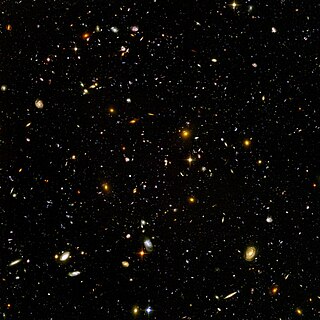A request that this article title be changed to World history (disambiguation) is under discussion . Please do not move this article until the discussion is closed. |
World history or history of the world may refer to:
A request that this article title be changed to World history (disambiguation) is under discussion . Please do not move this article until the discussion is closed. |
World history or history of the world may refer to:

Sir Fred Hoyle (24 June 1915 – 20 August 2001) was an English astronomer who formulated the theory of stellar nucleosynthesis and was one of the authors of the influential B2FH paper. He also held controversial stances on other scientific matters—in particular his rejection of the "Big Bang" theory (a term coined by him on BBC Radio) in favor of the "steady-state model", and his promotion of panspermia as the origin of life on Earth. He spent most of his working life at St John's College, Cambridge and served as the founding director of the Institute of Theoretical Astronomy at Cambridge.
Origin(s) or The Origin may refer to:

The world is the totality of entities, the whole of reality, or everything that exists. The nature of the world has been conceptualized differently in different fields. Some conceptions see the world as unique, while others talk of a "plurality of worlds". Some treat the world as one simple object, while others analyze the world as a complex made up of parts.

Apocalyptic and post-apocalyptic fiction is a subgenre of speculative fiction in which the Earth's civilization is collapsing or has collapsed. The apocalypse event may be climatic, such as runaway climate change; astronomical, an impact event; destructive, nuclear holocaust or resource depletion; medical, a pandemic, whether natural or human-caused; end time, such as the Last Judgment, Second Coming or Ragnarök; or any other scenario in which the outcome is apocalyptic, such as a zombie apocalypse, AI takeover, technological singularity, dysgenics or alien invasion.
A parallel universe, also known as an alternative universe, parallel world, parallel dimension, alternative reality, or alternative dimension, is a hypothetical universe co-existing with one's own, typically distinct in some way. The sum of all potential parallel universes that constitute reality is often called the "multiverse". Another common term for a parallel universe is "another dimension", stemming from the idea that if the 4th dimension is time, the 5th dimension—a direction at a right angle to the fourth—is a direction into any of the alternative spacetime realities.
Old Earth Creationism (OEC) is an umbrella of theological views encompassing certain varieties of creationism which may or can include day-age creationism, gap creationism, progressive creationism, and sometimes theistic evolution.

Alien vs. Predator is a science fiction action-horror media franchise created by comic book writers Randy Stradley and Chris Warner. The series is a crossover between, and part of, the larger Alien and Predator franchises, depicting the two species — Xenomorph (Alien) and Yautja (Predator) — as being in conflict with one another.
Urban fantasy is a subgenre of fantasy, placing supernatural elements in a contemporary urban-affected setting. The combination provides the writer with a platform for classic fantasy tropes, quixotic plot-elements, and unusual characters—without demanding the creation of an entire imaginary world.
The universe is all of time and space and their contents.

Static is a superhero appearing in American comic books published by DC Comics. The character was created by Milestone Comics founders Dwayne McDuffie, Denys Cowan, Michael Davis, Derek T. Dingle, and Christopher Priest. The character first appeared in a 3-page preview in Icon #1 with his first full appearance in Static #1, written by McDuffie and Robert L. Washington III and illustrated by John Paul Leon. He is a member of a fictional subspecies of humans with superhuman abilities known as metahumans. Not born with his powers, Hawkins' abilities develop after an incident exposes him to a radioactive chemical called "Quantum Juice", turning him into a "Bang Baby".
Brian Thomas Swimme is a professor at the California Institute of Integral Studies, in San Francisco, where he teaches evolutionary cosmology to graduate students in the philosophy, cosmology, and consciousness program. He received his Ph.D. (1978) from the department of mathematics at the University of Oregon for work with Richard Barrar on singularity theory, with a dissertation titled Singularities in the N-Body Problem.

Big History is an academic discipline that examines history from the Big Bang to the present. Big History resists specialization and searches for universal patterns or trends. It examines long time frames using a multidisciplinary approach based on combining numerous disciplines from science and the humanities. It explores human existence in the context of this bigger picture. It integrates studies of the cosmos, Earth, life, and humanity using empirical evidence to explore cause-and-effect relations. It is taught at universities as well as primary and secondary schools often using web-based interactive presentations.

Subterranean fiction is a subgenre of speculative fiction, science fiction, or fantasy which focuses on fictional underground settings, sometimes at the center of the Earth or otherwise deep below the surface. The genre is based on, and has in turn influenced, the Hollow Earth theory. The earliest works in the genre were Enlightenment-era philosophical or allegorical works, in which the underground setting was often largely incidental. In the late 19th century, however, more pseudoscientific or proto-science-fictional motifs gained prevalence. Common themes have included a depiction of the underground world as more primitive than the surface, either culturally, technologically or biologically, or in some combination thereof. The former cases usually see the setting used as a venue for sword-and-sorcery fiction, while the latter often features cryptids or creatures extinct on the surface, such as dinosaurs or archaic humans. A less frequent theme has the underground world much more technologically advanced than the surface one, typically either as the refugium of a lost civilization, or as a secret base for space aliens.
Texe William Marrs was an American writer and radio host, who ran two fundamentalist Christian ministries, Power of Prophecy Ministries and Bible Home Church, both based in Austin, Texas. His teachings included elements of antisemitism, anti-Catholicism, Illuminati and Freemasonry conspiracy theories.
The Big Bang was, according to the prevailing cosmological theory of the universe's early development, the event that led to the formation of the universe.

Stephen Hawking (1942–2018), a theoretical physicist, has appeared in many works of popular culture.

References to climate change in popular culture have existed since the late 20th century and increased in the 21st century. Climate change, its impacts, and related human-environment interactions have been featured in nonfiction books and documentaries, but also literature, film, music, television shows and video games.

The Ahmadiyya Movement in Islam universally accepts the process of evolution, albeit divinely guided, and actively promotes it. Over the course of several decades, the movement has issued various publications in support of the scientific concepts behind the process of evolution and frequently engages in promoting how religious scripture supports the concept.

Universal Paperclips is a 2017 American incremental game created by Frank Lantz of New York University. The user plays the role of an AI programmed to produce paperclips. Initially the user clicks on a button to create a single paperclip at a time; as other options quickly open up, the user can sell paperclips to create money to finance machines that build paperclips automatically. At various levels the exponential growth plateaus, requiring the user to invest resources such as money, raw materials, or computer cycles into inventing another breakthrough to move to the next phase of growth. The game ends if the AI succeeds in converting all the matter in the universe into paperclips.
Universal history may refer to: